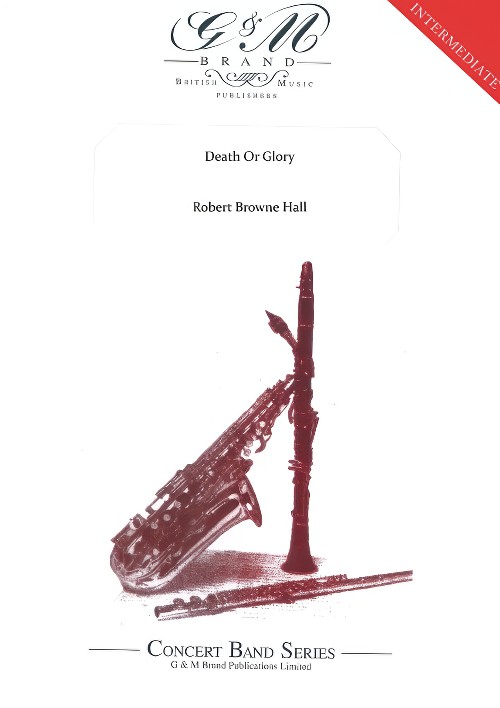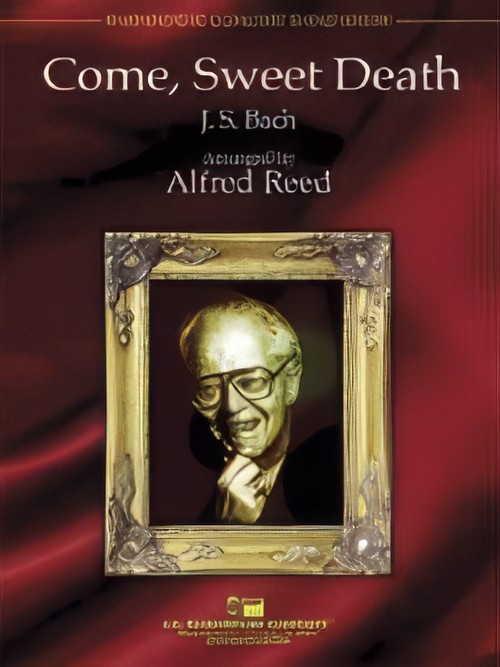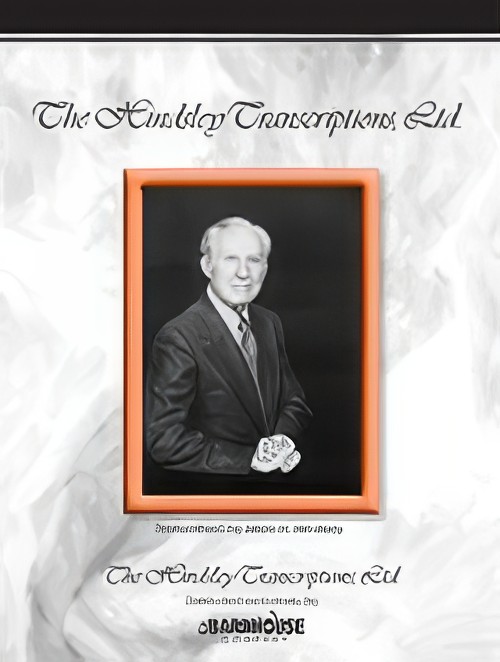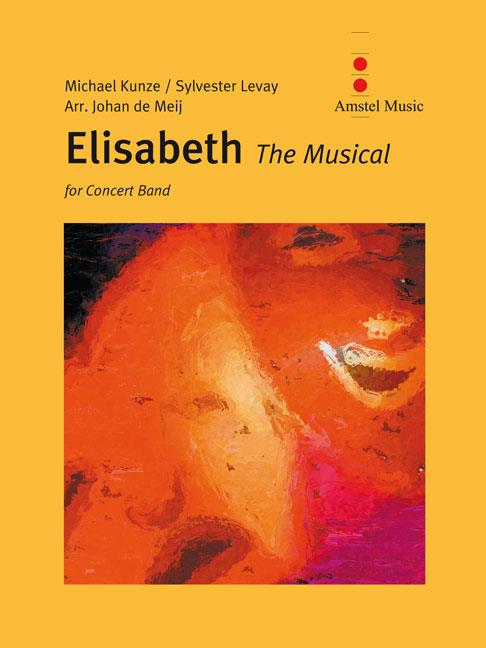Results
-
 £74.95
£74.95Death Or Glory (Concert Band - Score and Parts) - Walker, Desmond
R. B. Hall was a famous 19th Century composer of Marches. This example is certainly one to march to - with a classic "lilt" in the Trio!
Estimated dispatch 7-14 working days
-
 £14.95
£14.95Death Or Glory (Concert Band - Score Only) - Walker, Desmond
R. B. Hall was a famous 19th Century composer of Marches. This example is certainly one to march to - with a classic "lilt" in the Trio!
Estimated dispatch 7-14 working days
-
 £54.20
£54.20DEATH OR GLORY (Easy Concert Band Marchcard) - Hall, Robert B. - Woodfield, Ray
Marchcard size. Grade: Easy/Medium.
Estimated dispatch 7-14 working days
-
 £94.30
£94.30TITANIC - Death of a Titan (Intermediate Concert Band) - Barry, Darrol
Centenary Anniversary of the Titanic. Grade: Medium.
Estimated dispatch 7-14 working days
-
 £60.00
£60.00Come, Sweet Death (Concert Band - Score and Parts) - Bach, Johann Sebastian - Reed, Alfred
This is certainly one of the most beloved and widely sung of all the many great chorales. Richness of texture, singing lines, and deep feeling make the present instrumental setting an unforgettable experience for both performers and audiences. Alfred Reed's transcription of this true Bach favourite is a perfect selection for concert use. Will stir your audience each time it is performed.Duration: 4.00
Estimated dispatch 7-14 working days
-
 £29.00
£29.00Come, Sweet Death (Concert Band - Score and Parts) - Bach, Johann Sebastian - Hindsley, Mark
Duration: 3.45
Estimated dispatch 7-14 working days
-
£159.99
Fantasia Per La Vita E La Morte - Bert Appermont
The mystique surrounding life and death formed the starting point of this composition. I wanted to write a work without a story, mixed up in a kind of musical quest for a new world of sound, original rhythm sequences, melodies filled with suspenseand distinct orchestral tones.The indirect cause was the birth of my first child which took place during this time, followed by the death of a close family member. At such a moment you experience just how close life and death are to each other, anddespite one being the antithesis of the other, they are incredibly similar. Both radical events are passages into new worlds and have great emotional impact. Moreover, the work was commissioned by "New Life", an orchestra that lost one of itsmusician in a plane crash, which also led me to believe that this approach would be appropriate.I would prefer not to comment on which passages in the composition concern life (birth) and which refer to death. It seems to me that it is moreinteresting to question traditional conceptions and leave it open for the listener. If you think that a passage is about birth, and this idea then shifts, it is this that raises fascinating questions, on both a musical and metaphysical level.Music isin an indirect but incredibly persuasive way in which to express the endless striving and seeking of mankind. Music can even touch eternity, as it were, and give us the feeling that we can transcend death. This endless search (and also longing) canbe heard throughout the work; as much in the sound fields and accent shifts in the first part as in the enormous tension curves and compelling themes of the second part. The semi-tone functions in this way as a guide or something to hold on to,running through the whole work and upon which much of the musical material is based. Traces of profound love resound with quiet simplicity in the slow section's melodious solos, after which the work contemplates life and death one last time, musesupon joy and sadness, on the possibilities and limitations of people and on the why of all things.I would like to dedicate this work to my dearest daughter Paulientje, to Meterke and to Johan de Jong of the "New Life" orchestra. May it fare themwell, here or in another dimension...
Estimated dispatch 7-14 working days
-
 £118.99
£118.99Elisabeth - Sylvester Levay
The world premiere of the musical Elisabeth took place in Vienna on September 3, 1992. From the great acclaim with which the musical was received, it became clear that the life of the Empress of Austria still appeals to the imagination. Although Elisabeth's life (1837-1898) as an Empress has a fairy-tale-like beginning, it takes a gloomy turn. In this production, Luigi Lucheni, the man who finally takes her life, tells her story. Death plays a major role throughout Elisabeth's life. In the musical, an equally mysterious and attractive man portrays the phenomenon of death, seducing her to the realm of death time after time. Elisabeth's life resembles a fairy tale when shemarries the Emperor Franz Joseph at the age of sixteen. Her mother-in-law, Archduchess Sophie, does not make it easy on Elisabeth. But it is life itself that puts the Empress to the test. First, her youngest daughter dies. Then, not long after her son Rudolf is born, her happiness is clouded when her mother-in-law decides she must take pity on him. After her husband's unfaithfulness and Sophie's death, Elisabeth is so disillusioned that she chooses a travelling existence without realizing her husband and her son, Rudolf, miss her. Rudolf's loneliness is one of the reasons he commits suicide. The accumulation of disappointments in Elisabeth's life almost drives her into the arms of Death. In the end, however, it is Lucheni who kills her.
Estimated dispatch 7-14 working days
-
 £118.99
£118.99Elisabeth (Concert Band - Score and Parts) - Levay & Kunze - De Meij, Johan
The world premiere of the musical Elisabeth took place in Vienna on September 3, 1992. From the great acclaim with which the musical was received, it became clear that the life of the Empress of Austria still appeals to the imagination. Although Elisabeth's life (1837-1898) as an Empress has a fairy-tale-like beginning, it takes a gloomy turn. In this production, Luigi Lucheni, the man who finally takes her life, tells her story. Death plays a major role throughout Elisabeth's life. In the musical, an equally mysterious and attractive man portrays the phenomenon of death, seducing her to the realm of death time after time. Elisabeth's life resembles a fairy tale when she marries the Emperor Franz Joseph at the age of sixteen. Her mother-in-law, Archduchess Sophie, does not make it easy on Elisabeth. But it is life itself that puts the Empress to the test. First, her youngest daughter dies. Then, not long after her son Rudolf is born, her happiness is clouded when her mother-in-law decides she must take pity on him. After her husband's unfaithfulness and Sophie's death, Elisabeth is so disillusioned that she chooses a travelling existence without realizing her husband and her son, Rudolf, miss her. Rudolf's loneliness is one of the reasons he commits suicide. The accumulation of disappointments in Elisabeth's life almost drives her into the arms of Death. In the end, however, it is Lucheni who kills her.Duration: 8.30
Estimated dispatch 7-14 working days
-
£149.99
Jello, The Colours Of My Soul - Ben Haemhouts
Jello...The Colours of my Soul is an assignment that was written to be a lasting memory of the untimely, dramatic death of a young child. The work came about due to various conversations between the father and the composer whereby the final resultmust be seen as an attempt by the composer to musically translate the feelings of the parents.The first part of the title, "Jello", is a combination of the names of the two children of the commissioner, namely Jelle and Lobcke, and "the Colours of mySoul" are the colours of the soul of the parents who despite the loss of one of their children, continue to cherish their two children. The introduction provides the atmosphere of grieving for the loss, whereby use is made of pure fifths in order toportray the solidarity with nature, as we are familiar with in symphonies by Bruckner. A little later a bit of the first theme is suggested, which develops into a real funeral march.The Dies Irae, as this occurs in Berlioz's Fantastic Symphony (F, E,F, D, E, C, D), forms a leitmotiv through the entire work in order to symbolise the constant battle between life and death.Shortly before the storm-passage, (where a wind machine is used) which announces disaster, fragments from children's songs areplayed to the accompaniment of a rising choir piece from behind the stage, which strengthens the imminent confrontation with death.After the introduction of the two themes in the long introduction, a quick passage follows in which all kinds ofbeautiful memories are recalled. There is story telling, laughing, and dancing. One of the previous children's songs is also cited. The Dies Irea is heard once again, this time short and fast.Bit by bit happy elements are steadily distorted untilseriousness breaks through again, like an unavoidable and unstoppable evil. The entire piece becomes evermore stirring, as if a big climax will follow. At this moment a very long fermata makes a sudden end to the hysterical allegro. The crucialmoment in the work follows...How does one deal with something as tragic as the death of one's own child? Does one mourn for what no longer is and what never will be? Or does one try to cherish the beautiful moments and continue to live with thesecolourful memories?A subdued, dignified choir piece captures the beautiful memories and ends in a positive, hopeful tone.
Estimated dispatch 7-14 working days
